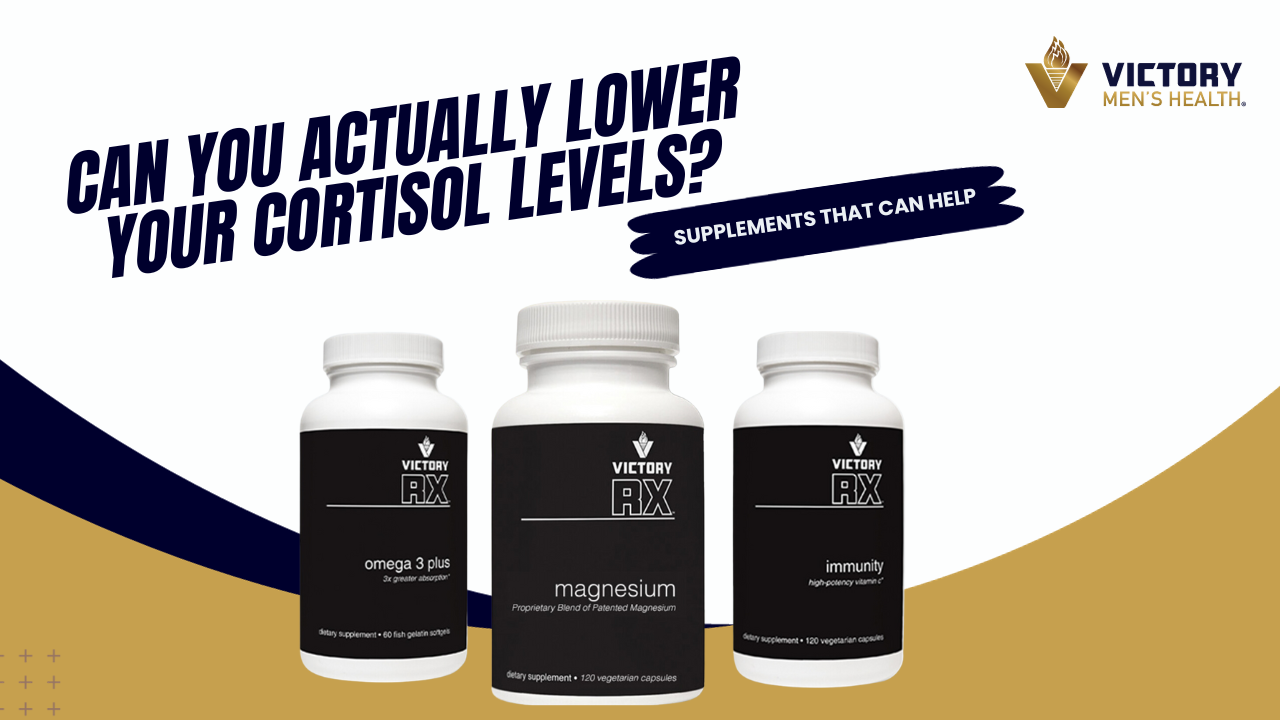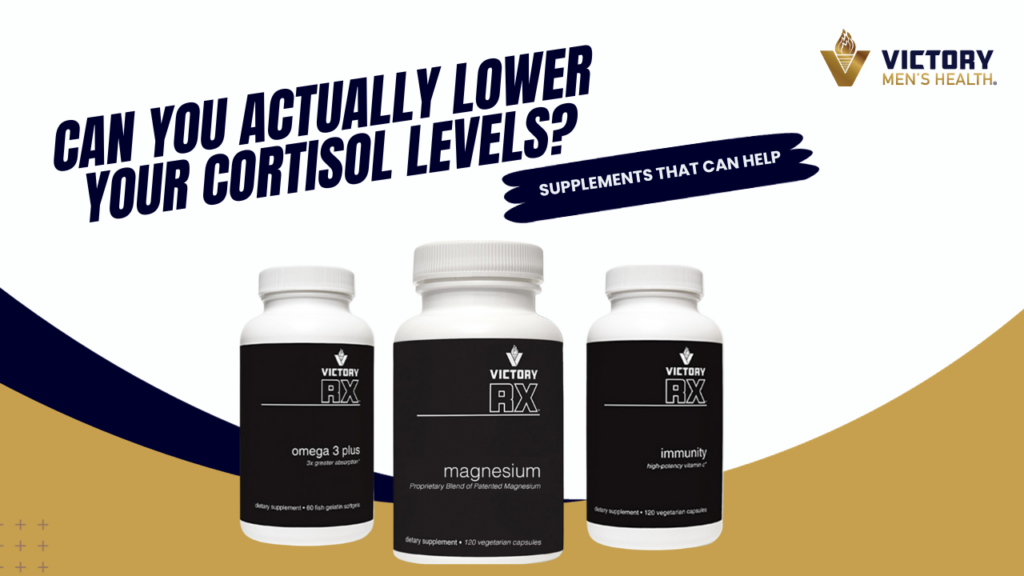Can You Actually Lower Your Cortisol Levels? | What We Know (& What To Take)
category: Health Optimization

In today’s fast-paced world, stress can be a constant companion for many of us. This stress impacts our bodies in various ways, one of which is through the production of the hormone cortisol. Understanding and managing your cortisol levels isn’t just about stress reduction; it’s crucial for your overall health and well-being.
We know that “managing cortisol” is a phrase you’ll likely hear as the latest and greatest health and wellness advice. And while we totally agree – it’s just not as simple as removing stressors from your life or taking a supplement. It’s a delicate balance, particularly for those dealing with symptoms like hair loss and erectile dysfunction.
So, can you actually lower your cortisol levels? Here’s everything you need to know about cortisol levels and how to reduce them.
What is Cortisol?
Cortisol, often referred to as the “stress hormone,” is produced by the adrenal glands. It plays a vital role in several bodily functions, including regulating metabolism, reducing inflammation, and assisting with memory formulation.
To put it simply, it’s that feeling of “fight or flight”.
What happens is so many of exist in a state of fight or flight constantly throughout our day. Something as simple as an email from our boss or an unexpected disturbance can send our body into panic, raising our cortisol levels unnecessarily. It’s a habit that can be difficult to break as managing your emotions and reactions isn’t something that always come second nature.
Is Your Cortisol Too High?
Men encounter unique stressors in their daily lives, like professional pressures and personal responsibilities. These stressors can trigger an imbalance in cortisol levels, leading to health issues that are often misunderstood or overlooked.
Let’s explore what it looks like to experience symptoms of high cortisol.
- Hair Loss: Chronic stress and high cortisol can disrupt the hair growth cycle, leading to hair loss.
- Erectile Dysfunction: Elevated cortisol can lower testosterone levels, impacting sexual health and function.
- Weight Gain: Cortisol can increase appetite and signal the body to store fat, especially in the abdominal area.
- Mood Swings and Depression: Long-term stress can lead to mood disorders, affecting mental health.
While these symptoms can occur, it can also manifest in overall anxiety as your body adjusts from wavering in and out of fight or flight. If you’re feeling on edge or generally stressed over everyday life, that can be a sign that your cortisol levels aren’t ideal.
I have High Cortisol – What Now?
While stress management is crucial, it’s often not sufficient to correct hormonal imbalances. A holistic approach is necessary, one that looks at lifestyle, diet, and professional medical guidance.
Lifestyle Changes Can Help
Simple lifestyle changes can impact cortisol levels. This includes regular exercise, a balanced diet rich in nutrients, and adequate sleep. Dietary adjustments, such as reducing caffeine and sugar intake, can also help regulate cortisol levels.
Long story short – limiting caffeine and sugar intake can contribute to lowering cortisol levels over time. Additionally, addressing sleep apnea is crucial, as it has been linked to increased cortisol levels.
Is Managing Stress Enough?
Self-management has its limits, especially when it comes to understanding the complexities of hormone levels in men. This is where we can come into play. A key aspect of our services is the comprehensive hormonal panel. This panel provides detailed insights into your hormone levels, offering a data-driven approach to treatment.
There’s a big difference between being within a ‘normal’ hormone range and being in an optimal range for health and well-being. Our team focuses on finding this optimal range for each individual, considering their unique health profile and lifestyle.
3 Supplements to Reduce Cortisol Levels
We’re big fans of high-quality supplements for men who need them. If you’re looking to reduce your cortisol levels, here are the supplements we recommend starting with:
- Magnesium – If there were an MVP award for minerals, then magnesium would be a frontrunner. Magnesium is one of the most important minerals needed by our bodies because it is necessary for heart health, bone density, sleep quality, and can aide in soothing muscle cramping.
- Omega -3 – Not all Omega 3s are created equal – this is the one to take!
- Vitamin C – Buffered C Capsules are balanced with calcium, magnesium and potassium to gently deliver a high-concentration vitamin C while reducing the potential of gastrointestinal upset.
- DHEA – Dehydroepiandrosterone (DHEA) is a hormone produced by the adrenal glands, and it plays a role in balancing the body’s hormones, including cortisol. DHEA is a precursor to both estrogen and testosterone and has been studied for its potential impact on cortisol levels. Some research suggests that DHEA may have a modulating effect on cortisol production, helping to regulate its levels.
While supplements aren’t an overnight solution, there are so many benefits to adding magnesium, omega -3, and vitamin c to your health routine.
Next Steps for Lowering Cortisol
Before you worry about your cortisol levels, the first step is to work with a health provider to get your hormone levels tested. Working with a provider who understands men’s health is key as “normal ranges” can still leave men feeling the effects of high cortisol.
Of course, it’s first and foremost recommended to limit stress and caffeine, eat nutritious meals, and exercise regularly. However, there is typically more at play that can’t be resolved with a few new health habits. Alongside more in-depth exploration of your symptoms, we recommend investing in high quality supplements to fill in your nutritional gaps. Specifically magnesium, omega -3, and vitamin c.
For those living in Missouri and Illinois, taking the first step towards balancing your cortisol levels and improving your overall health is easy with Victory Men’s Health. Whether through telehealth or in-person visits, our team is ready to assist you with a comprehensive panel to identify where you might be lacking and develop a treatment plan that works for you. Contact us today to book a consultation and begin your journey to a healthier, happier you.
Have you had your cortisol levels checked? What is your best tip for reducing stress in your everyday life? Tell us in the comments!
